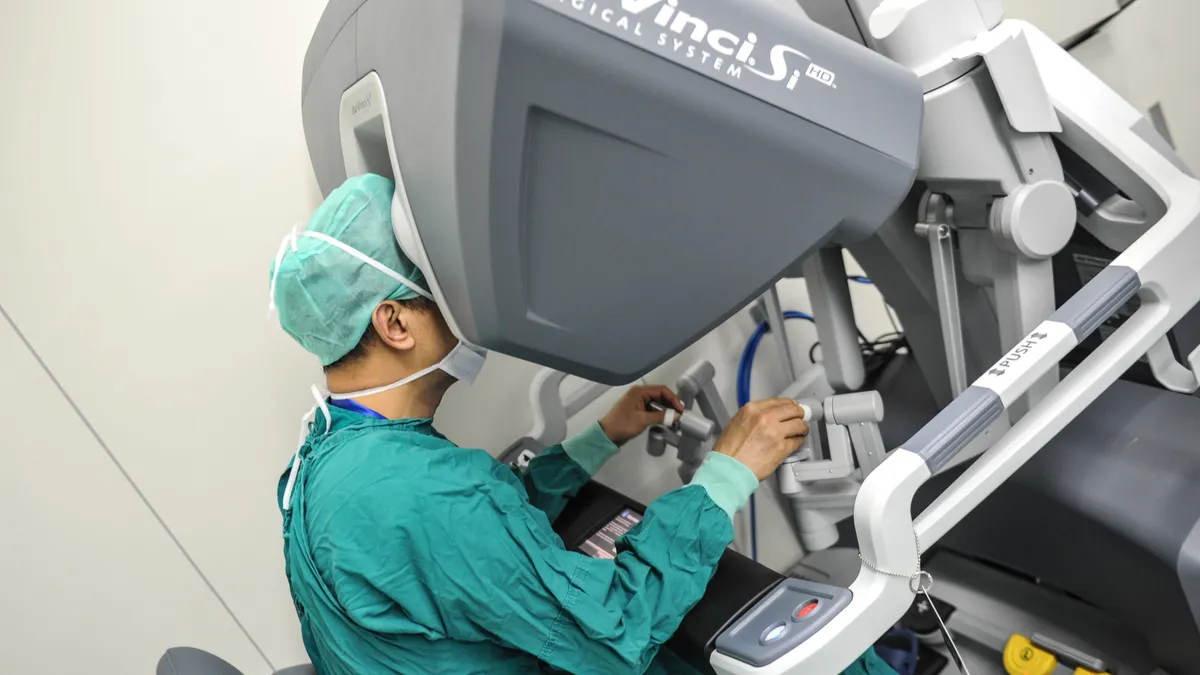Dive Brief:
- In an earnings preview on Wednesday, surgical robotics maker Intuitive said it expects revenues of about $1.6 billion for the fourth quarter, beating Wall Street's expectations.
- The numbers were largely driven by hospital placements of Intuitive's da Vinci robots, which have remained strong for the last four quarters, despite the rise of new COVID-19 variants and staffing challenges as a result.
- Looking to 2022, Intuitive gave a more conservative outlook, with procedures expected to increase between 11% and 15% compared to 2021. The company expects the pandemic to affect its business through the rest of the year.
Dive Insight:
After seeing procedures slow from the delta variant, medical device companies are bracing for another bumpy year of the COVID-19 pandemic as the omicron variant is rapidly spreading. Across the industry, they are grappling with supply chain disruptions and continued staffing shortages, none of which are expected to resolve soon.
In spite of these challenges, Intuitive said it installed more of its da Vinci surgical systems than expected in hospitals during the fourth quarter. In a preliminary earnings report on Wednesday, Intuitive said it expects to bring in about $1.6 billion in revenue for the fourth quarter, up 17% compared to 2020 and beating Wall Street expectations. For the full year, it expects $5.7 billion in revenue, a 31% increase from 2020.
Stifel analysts wrote in a research note that better-than expected system placement revenues helped drive the results. Even with the pressure on hospital staffing, and logistics challenges, Intuitive CEO Gary Guthart said during a J.P. Morgan healthcare conference presentation that system placements "remained healthy."
Intuitive saw a significant increase from last year, shipping a total of 326 devices in the fourth quarter. For the year, it shipped a total of 1,347 surgical robots, a 44% increase from 2020.
In the U.S., much of the volume came from purchases by large integrated delivery networks. They're placing more surgical robots at smaller hospitals that are starting their first da Vinci programs, Intuitive CFO Jamie Samath said.
The company also expects to see its instruments and accessories business grow by 13% to $843 million in the quarter. Two years ago, Intuitive launched an extended use program to extend the lifespan of some of its instruments, hoping to build up customer loyalty as competitors were poised to launch.
The pandemic continued to affect procedure volumes, as non-emergency surgeries were once again delayed as COVID-19 cases surged in the fall, and again at the beginning of the winter. Procedures for the fourth quarter were up about 19% compared to the same period in 2020, when a winter surge also hampered hospital capacity.
In October and November, Samath said procedures were starting to recover from the impact of the delta variant during the previous quarter. The effects of the current surge started to show up in mid-December, when a rapid rise in cases hampered hospital staffing.
"That continued into January and so far has gotten worse as you might expect, as hospitalization rates have continued to climb," Samath said.
Looking to next year, Intuitive expects a bumpy road ahead as the pandemic continues. It expects da Vinci procedures to increase about 11% to 15% compared to 2021. Baked into that outlook is the expected impact of omicron and staffing shortages this quarter, and "a continued moderate impact for the remainder of the year from Covid," Samath said. It also includes some optimism, forecasting no significant new COVID waves on the higher end of the guidance.
Mike Polark, senior analyst at Baird, wrote in a research note that this outlook "likely leans conservative and is likely to be embraced as such."
Other medical device companies are taking a more optimistic outlook. Boston Scientific CEO Mike Mahoney said at the J.P. Morgan conference that the company is seeing an impact from COVID-19, but it has decreased with each wave.
"That gives us more confidence in 2022, as, hopefully, this omicron will plateau," Mahoney said.
In the meantime, Intuitive is looking to make inroads into more types of procedures. In the U.S., general surgery has been leading growth, but the company also sees opportunities for its surgical robots in hernia repair, bariatrics and colorectal procedures.
It's difficult to suss out whether the pandemic has driven more hospitals to laparoscopic procedures, which have shorter recovery times and might free up medical staff.
"What is surgery as a whole doing during this pandemic? It's really driven by resource constraints at hospitals, whether its ICU capacity, or more recently the ability to staff ORs," Guthart said. "That is by far the biggest demographic challenge or biggest issue going on in the last couple of years."
The CEO added that while these challenges may resolve, the timing certainly won't be quick.










